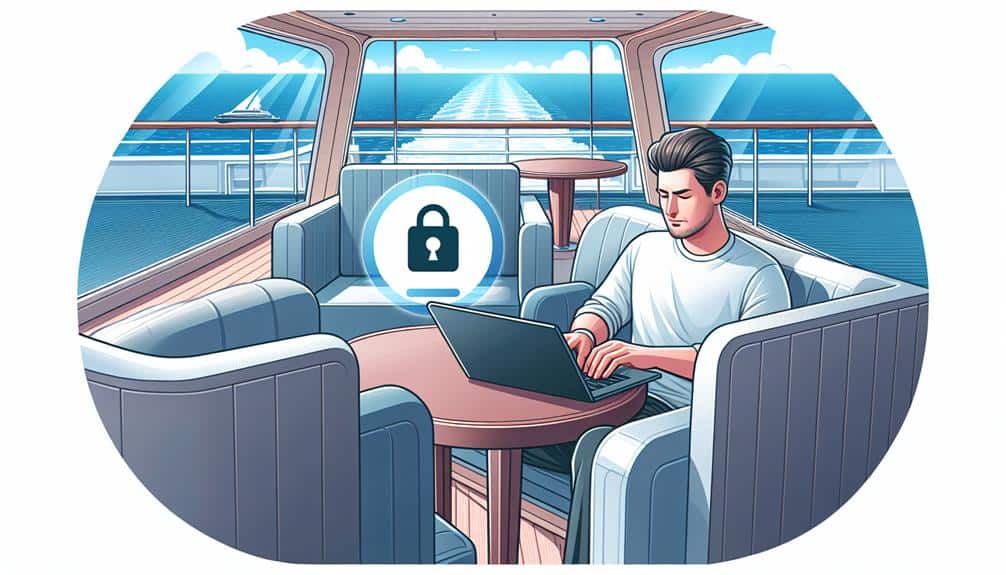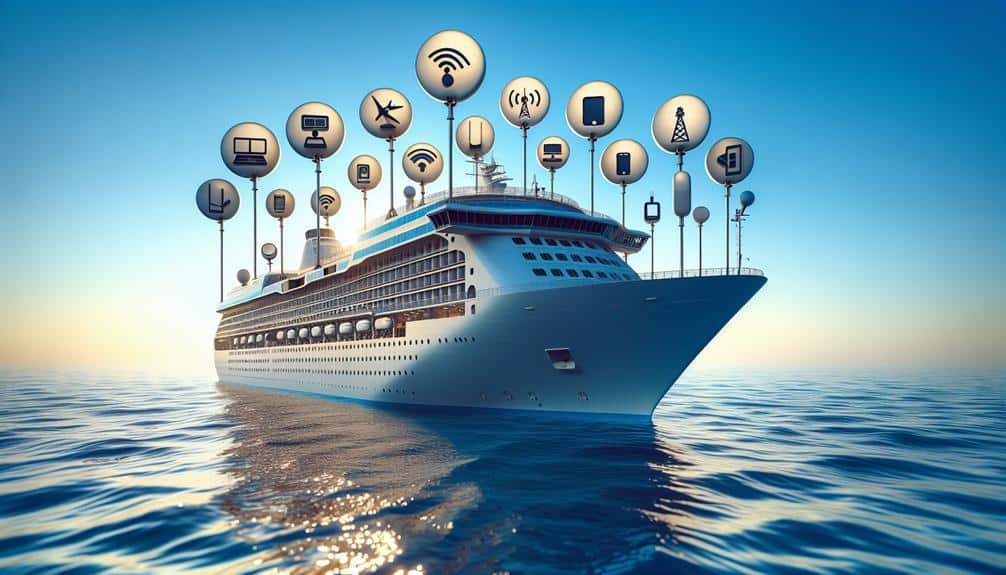To safeguard your internet usage on cruise ships, protect your devices with encryption and strong passwords. Utilize VPNs for privacy, encoding data from cyber threats. Stay vigilant on public Wi-Fi, confirm networks, and refrain from sharing sensitive info. Update software regularly to fix security flaws and protect against malware. By abstaining from sharing personal information, using secure connections, and adhering to these measures, you'll guarantee a safe online experience on your cruise.
Key Points
- Use a VPN to encrypt data and protect privacy on cruise ship networks.
- Avoid sharing sensitive information to minimize cyber threats while onboard.
- Be cautious with public Wi-Fi on ships; verify network legitimacy before connecting.
- Update software regularly to maintain device security against emerging threats.
- Implement device encryption and strong passwords for data protection during travel.
Secure Your Devices
How can you guarantee the security of your devices while enjoying internet access on cruise ships? To assure the safety of your information, two critical measures must be in place: device encryption and password protection.
Device encryption is a fundamental security feature that scrambles data on your device into a code that can only be accessed with the correct encryption key. By encrypting your device, you add an extra layer of security that prevents unauthorized access to your sensitive information, even if your device is lost or stolen during your cruise.
Equally important is password protection. Utilizing strong, unique passwords for each of your devices ensures that even if one password is compromised, the rest of your devices remain secure. Make sure to create complex passwords with a mix of letters, numbers, and special characters to enhance security.
Use VPN for Privacy
Consider incorporating a Virtual Private Network (VPN) to enhance your privacy and security while accessing the internet on cruise ships. A VPN provides several benefits that can greatly improve your online experience. One of the key advantages of using a VPN is data encryption. When you connect to the internet through a VPN, your data is encrypted, making it extremely difficult for cybercriminals to intercept and decipher your information. This encryption guarantees that your sensitive data, such as login credentials or personal details, remains secure from potential threats.
Additionally, a VPN can help you bypass any restrictions or censorship that may be in place on the ship's network. By masking your IP address and encrypting your connection, a VPN allows you to browse the internet anonymously and access geo-blocked content. This can be particularly useful if you want to access certain websites or services that may be limited in the region where the cruise ship is located.
Be Wary of Public Wi-Fi
Exercise caution when connecting to public Wi-Fi networks on cruise ships to safeguard your personal information from potential security risks. Public Wi-Fi networks on cruise ships can be convenient but are also prime targets for cyber threats due to their lack of adequate security measures. When using public Wi-Fi, make sure that the network is legitimate and avoid accessing sensitive information such as online banking or personal emails.
To mitigate the risks associated with public Wi-Fi, consider using data encryption tools such as Virtual Private Networks (VPNs). VPNs create a secure and encrypted connection between your device and the internet, protecting your data from potential eavesdropping by cybercriminals on the same network.
Cyber threats like Man-in-the-Middle attacks are prevalent on public Wi-Fi networks, where hackers intercept your data transmissions. By employing data encryption through VPNs, you add an extra layer of security that makes it significantly harder for cybercriminals to steal your information. Be proactive in safeguarding your data while enjoying the convenience of public Wi-Fi on cruise ships.
Update Software Regularly
Regularly updating your software is vital to maintaining the security of your devices and protecting them from potential vulnerabilities. Software security is essential in safeguarding your data and ensuring a safe internet experience on cruise ships. By keeping your operating system, antivirus programs, web browsers, and other applications up to date, you can patch known security flaws and reduce the risk of cyber threats targeting outdated software.
Updating your software not only enhances its performance but also strengthens its defenses against emerging malware and cyber-attacks. Hackers often exploit outdated software to gain unauthorized access to your device, compromising your data protection. Regular software updates provide patches for known vulnerabilities, making it harder for malicious actors to exploit weaknesses in your system.
To guarantee excellent software security and data protection while using cruise ship internet services, make it a habit to check for updates regularly. Set up automatic updates wherever possible and be proactive in installing patches to stay ahead of potential security risks. Remember, staying vigilant with software updates is a proactive measure in the ongoing battle against cyber threats.
Avoid Sharing Sensitive Information
To enhance your security while using cruise ship internet services, minimize the risk of cyber threats by refraining from sharing sensitive information online. Social media privacy plays an important role in safeguarding your personal data. Avoid posting details such as your full name, birthdate, address, or other private information that could be used maliciously by cybercriminals.
Additionally, be cautious of phishing scams, which are fraudulent attempts to obtain sensitive information by disguising as trustworthy entities. Cyber security awareness is vital; always verify the authenticity of websites before entering any personal data.
Furthermore, prioritize data protection by using secure connections when accessing sensitive accounts or conducting online transactions. Utilize virtual private networks (VPNs) to encrypt your internet traffic and prevent unauthorized access to your data. Remember that once information is shared online, it can be challenging to completely erase it.
Frequently Asked Questions
Can Cruise Ship Staff Access Personal Information on My Devices While I Am Connected to the Ship's Wi-Fi?
While connected to a cruise ship's Wi-Fi, it is possible for staff to access personal information on your devices, posing privacy concerns. Be cautious when using onboard networks to safeguard your data.
How Can I Prevent Hackers From Intercepting My Data While Using the Internet on a Cruise Ship?
To safeguard your data on a cruise ship, prioritize privacy concerns by utilizing data encryption. Enhance cyber security through network security measures. By implementing these strategies, you can prevent hackers from intercepting your sensitive information while browsing.
Are There Any Specific Security Measures I Should Take When Using the Internet in International Waters?
When using the internet in international waters, prioritize cyber security. Be vigilant about privacy concerns and Wi-Fi security. Implement strong encryption, use secure connections, and avoid accessing sensitive information on public networks to safeguard your data.
Is It Safe to Use Online Banking or Make Online Purchases While on a Cruise Ship?
When on a cruise ship, using online banking or making purchases involves cyber security risks due to potential privacy concerns. Internet connectivity may vary, with bandwidth limitations affecting transactions. Exercise caution and use secure networks.
What Steps Can I Take to Protect My Devices From Malware and Viruses While Using the Internet on a Cruise Ship?
To protect your devices from malware and viruses while using the internet, enable device encryption, utilize a VPN for secure connections, stay vigilant against phishing attempts, and configure robust firewall settings. These measures enhance your online safety.



